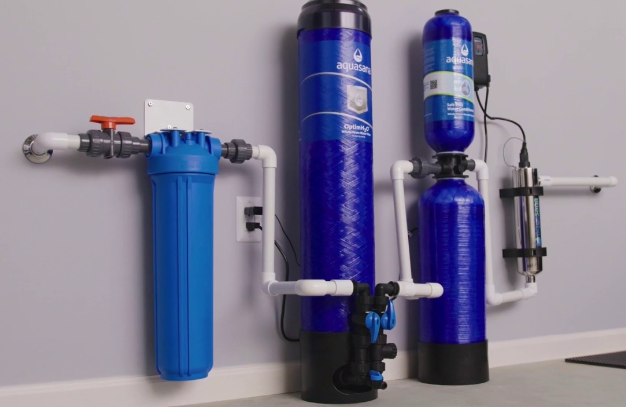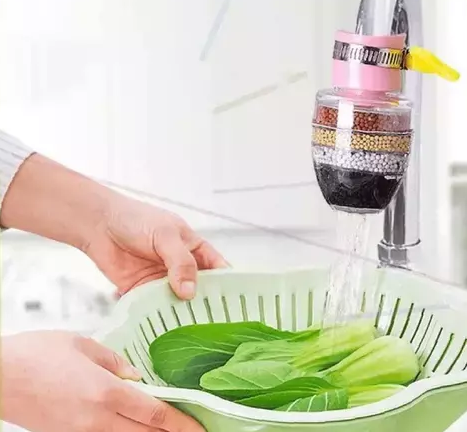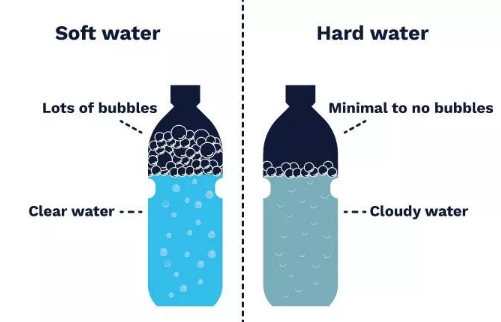Last Updated on September 8, 2023 by Jeffrey B Roberts
Yes, you can filter softened water for drinking. When it comes to softening water, the process typically involves removing minerals such as magnesium and calcium from hard water by exchanging them with sodium ions. This means that softened water contains more sodium than regular tap water, but it does not make it any less safe for drinking. However, for those looking for a way to reduce sodium levels in their drinking water, filtering softened water is an option. A variety of filter types are available that can remove unwanted contaminants from soft water and make it safe for consumption.
Can You Filter Softened Water For Drinking?

Softened water is suitable for everyday use, including drinking. But it may taste a bit salty and unpleasant due to the presence of sodium ions that are added during the softening process. To make softened water more palatable, you can filter it using carbon filters or reverse osmosis systems. These systems remove chlorides and other impurities, leaving behind pure water that is safe to drink. It’s important to regularly replace the filters in your filter system, as they accumulate impurities over time and can lead to bacterial contamination of your drinking water if not replaced regularly.
- If you are looking for a way to reduce the amount of sodium in your drinking water, filtering softened water is an option worth considering. With the right filter system in place, it can make your soft water safe for consumption.
- If you are looking for a way to completely remove all sodium from your drinking water, then installing a reverse osmosis system may be a better option.
- If you are concerned about other contaminants in the water supply, such as chlorine or other chemical compounds, then you may want to consider filtering the softened water before drinking it.
Can You Filter Softened Water For Cooking?

Yes, you can filter softened water for cooking. While softening water typically involves removing minerals such as magnesium and calcium by exchanging them with sodium ions, this does not make it any less safe for cooking. Filters are available that can reduce the amount of sodium in your softened water, making it safe for cooking.
How To Make Soft Water Drinkable?
- Add Sodium Ions: Sodium ions can be added to softened water to increase the taste without increasing the sodium content too much.
- Use a Water Filter: Using a water filter is an effective way to reduce contaminants and improve the taste of softened water without adding any extra sodium.
- Add Minerals: Adding minerals such as calcium or magnesium back into the softened water can help improve the taste and provide some beneficial minerals.
- Add Lemon Juice: Adding a squeeze of fresh lemon juice to softened water can help to reduce the sodium content while also improving the taste.
- Reverse Osmosis Drinking Water Filter: A reverse osmosis drinking water filter is a great way to reduce contaminants and improve the taste of softened water.
- Potassium Chloride VS. Sodium Chloride Pellets: Potassium chloride pellets can be used instead of sodium chloride in a water softener, reducing the sodium content while still effectively softening the water.
- Distillation: Distillation is an effective way to reduce contaminants and also improve the taste of softened water.
How To Filter Softened Water?
- Step 1: Install a filter system designed to reduce the amount of sodium in softened water.
- step2: Connect the filter system to your softening unit, so that it can filter the softened water before it reaches your tap.
- Step3: Run the softened water through the filtration process. This typically involves passing the water through layers of filter media that trap and remove any unwanted minerals, such as sodium.
- Step4: Once the filtration process is complete, check to make sure the amount of sodium in your water has been reduced. If it has, then you can enjoy safe drinking water from your softened water source.
Do note that while filtering softened water can reduce the amount of sodium in the water, it cannot completely remove all of the salt.
Does the Water Filter Remove Salt From the Softener?
Yes, a water filter can remove salt from softened water. Many filters use a process of filtration that helps to reduce the amount of sodium in the water by trapping and removing it. This means that after passing through the filter system, your softened water should have less sodium than before, making it safe for drinking.
Does A Charcoal Filter Remove The Salt From Softened Water?

Yes, a charcoal filter can remove the salt from softened water. Charcoal filters are designed to trap and reduce the amount of unwanted minerals or contaminants in water, such as sodium. After passing through the filter system, your softened water should have less sodium than before, making it safe for drinking.
How To Filter Salt Out Of Softened Water / How To Filter Sodium Out Of Softened Water
- STEP1. Purchase the necessary equipment. A water softener is a device that helps to filter sodium from softened water. It usually consists of an inlet tube, a brine tank, and two storage tanks for filtered water.
- STEP 2. Install the equipment using the manufacturer’s instructions. Make sure to check local building codes before installing any type of major plumbing equipment.
- STEP 3. Prepare the brine tank by adding salt to it and filling it with water according to the manufacturer’s instructions.
- STEP 4. Connect the inlet tube of the water softener to your home’s main water supply line, typically found near the hot water heater. Make sure all connections are secure and tight.
- STEP 5. Connect the outlet tubes to the storage tanks of the water softener using flexible plumbing hoses, which are usually included in the unit.
- STEP 6. Program the settings on your water softener according to manufacturer’s instructions. The settings must be adjusted in order for the device to filter sodium from softened water effectively.
- STEP 7. Test the water softener periodically to check that it is working properly and effectively filtering out sodium from softened water. You can purchase water testing kits at a local home improvement store to use for this purpose.
- STEP 8. Clean and maintain the water softener regularly as recommended by the manufacturer in order to keep it functioning optimally and efficiently. This includes adding salt to the brine tank when it is needed, cleaning any debris from the tanks or tubes, replacing worn parts, and examining all connections for signs of leaks or other damage.
Which Water Is Better To Drink, Hard Water Or Soft Water, And Why?

Hard water contains more minerals, such as calcium and magnesium, which is beneficial for drinking and cooking. Soft water, on the other hand, does not contain these minerals but can be easier to rinse soaps off dishes or clothes.
Benefits Of Soft Water:
- No mineral buildup on surfaces like pipes or fixtures
- Improves the efficiency of hot water appliances
- Reduces soap scum buildup in showers and bathtubs
- Easier to rinse off soaps and detergents when cleaning dishes or clothes
- Better-tasting drinking water
- Reduces the amount of energy used to heat water.
Drinking Softened Water Side Effects:
- Higher sodium content can lead to an increased risk of high blood pressure.
- Possible toxicity from chemicals used in the softening process.
- Lower beneficial mineral content, such as calcium and magnesium, can lead to deficiencies over time if consumed in large quantities.
- Increased energy costs for heating softened water.
- Unpleasant taste due to higher sodium content.
- Increased risk of pipe corrosion due to increased pH levels in the water.
Faqs
What Is Soft Water?
Soft water is water that has been treated to reduce the number of minerals, such as calcium and magnesium, it contains. Soft water often has a higher pH level than hard water and does not form scale on surfaces like pipes or fixtures when heated. This makes soft water ideal for use in washing machines, dishwashers, and other appliances that are sensitive to mineral buildup.
Can I Drink Softened Water?
Yes, softened water can be used for drinking.
Does Soft Water Contain Sodium?
Soft water can contain sodium if the softening process involves adding salt to the water. The amount of sodium in softened water varies depending on how much salt is added during the process and should be checked before drinking it.
Are There Any Disadvantages Of Soft Water?
Yes, there are some disadvantages associated with soft water.
Can You Drink Water From A Water Softener?
Yes, you can drink water from a water softener if the system is properly maintained and does not have any added chemicals or contaminants. However, some people may find the taste of softened water unpleasant due to its higher sodium content. Additionally, those on low-salt diets should avoid drinking softened water as it could negatively impact their health.
What Are Some Alternatives To Softening Water?
Some alternatives to softening water include: installing a whole-house water filter, using a distiller to remove contaminants, and adding minerals to the water. Additionally, potassium chloride pellets can be used instead of sodium chloride in a water softener, reducing the sodium content while still effectively softening the water.
Is It Safe To Drink Softened Water When Pregnant?
No, it is not recommended to drink softened water when pregnant due to its higher sodium content. Softened water can also contain toxins and chemicals that can be harmful to a developing baby. It is best to consult with a doctor before drinking softened water when pregnant.
Is It Safe To Drink Water Softened With Potassium Chloride?
Yes, it is generally safe to drink water softened with potassium chloride.
Is It Safe To Drink Filtered Softened Water?
Yes, it is generally safe to drink filtered softened water. However, it is important to use a quality filter designed for drinking water and follow the manufacturer’s instructions. Additionally, it is best to have the water tested periodically to ensure its safety.
A good rule of thumb is to avoid drinking softened water if possible, especially for people with special dietary needs or health conditions. In order to ensure the safety of drinking softened water, it is best to consult with a doctor before consumption.
Is Soft Water Good For Your Skin?
Soft water can be beneficial for those who suffer from dry, itchy skin.
Will A Filter Soften Water?
No, a filter will not soften water. Softening water involves removing minerals such as magnesium and calcium by exchanging them with sodium ions, and this process cannot be done using a filter system. However, you can use a filtration system to reduce the amount of sodium in softened water, making it safe for drinking and cooking.
Conclusion
In conclusion, it is possible to filter softened water for drinking. However, it is important to ensure that the filter you use is of good quality and can effectively remove any contaminants present in your softened water. Additionally, the type of filter you choose will depend on how much chlorine or other impurities are present in your water. If there are significant levels of these materials, you may want to consider using a reverse osmosis filter. By taking the proper steps, you can safely and effectively filter softened water for drinking.

Meet Jeffrey B Roberts, your dedicated guide into the realm of water science and technology. As a hydro biologist with an insatiable curiosity, Jeffrey’s journey has been one of unraveling the mysteries of water systems and advocating for clean, safe water for all.
With an academic background steeped in the sciences, Jeffrey’s passion lies at the crossroads of science, technology, and nature. A deep fascination with plants and genetics has not only enriched their understanding of aquatic ecosystems but has also propelled them into the world of water softening solutions.
Believing that clean water is a basic human right, Jeffrey’s writing transcends the technicalities, making the intricate world of water softening accessible to all. Through their blog, they ardently share insights, tips, and breakthroughs, empowering readers to make informed decisions about their water quality.
Beyond his role as a prolific writer, Jeffrey is a respected figure in the hydronics industry education. With years of hands-on experience, they serve as an adjunct professor, nurturing the next generation of experts at the Thaddeus Stevens College of Technology. His involvement on the Technical Advisory Board further cements their dedication to pushing the boundaries of innovation in water technology.
